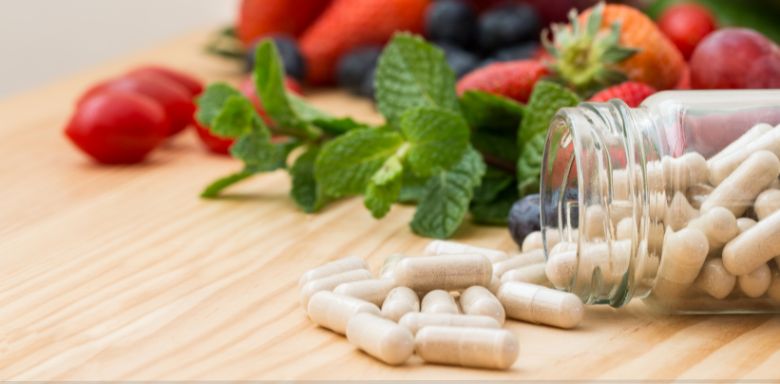Revitalizing Your Vascular Health
Proper circulation or blood flow through the body helps deliver the needed nutrients and oxygen to the organs, tissues, and cells. If blood circulation is reduced, it can lead to several problems, such as slow wound healing, fatigue, muscle cramps, and cold hands and feet.
Several different medical conditions and diseases may affect the efficiency of blood flow, such as diabetes, high cholesterol, and peripheral artery disease.
The good news is there are treatments and lifestyle changes you can make to potentially help increase blood flow. For instance, one thing that may help is adding certain vitamins and blood flow supplements.
Although no definitive consensus exists on how much supplements may help blood flow, some studies show that they may. In addition, many of the vitamins and supplements that may help with blood flow also have other health benefits.
8 Vitamins and Supplements to Enhance Blood Circulation
Below are several vitamins and blood flow supplements that may help improve circulation.
1. Vitamin K
Vitamin K naturally occurs in two forms, including K1 and K2. Vitamin K1 is found in plant-based foods, and Vitamin K2 is found in animal products. Vitamin K helps with wound healing and cardiovascular health.
Research in the journal Thrombosis and Haemostasis indicated that long-term vitamin K supplements may improve arterial stiffness in some people. When the arteries become stiff, blood flow is less efficient. Reducing stiffness may promote better blood flow through the vessels.
2. Vitamin B3
Vitamin B3, also known as niacin, may help improve blood flow, resulting in overall heart health. High levels of low-density lipid cholesterol can lead to plaque buildup in the arteries. The plaque can affect the blood vessels and impede blood flow. Inflammation may also affect how well blood can move through the vessels.
Vitamin B3 supplements may help heart health by reducing inflammation and LDL cholesterol levels. Although vitamin B3 is present in many types of foods, it is also available as a supplement. Vitamin B3 is often found in a multivitamin, vitamin B complex, or stand-alone supplement.
3. Iron
Iron is a mineral found in several types of foods, such as red meat. The body needs iron to make hemoglobin. Hemoglobin carries oxygen via the blood, through the body. If iron is low, hemoglobin levels may also decrease. If hemoglobin levels are low, your body may get less oxygen and cause symptoms of poor blood flow, such as fatigue. Taking an iron supplement may help.
4. Capsaicin
Capsaicin is a compound found in chili peppers, which is what supplements are usually derived from. Research in the journal Cells found that capsaicin may act as a vasodilator. This means it widens the blood vessels and improves blood flow. Although limited studies exist that indicate capsaicin can treat blood flow problems, its vasodilator effect seems to indicate it may help.
5. Garlic
Many have used garlic for decades for its cardiovascular health benefits. Garlic contains anti-inflammatory and antioxidant compounds, such as allicin. Allicin may help relax blood vessels, promoting improved blood flow.
Although more research is needed, according to the National Center for Complementary and Integrative Health, garlic may also be helpful for blood pressure. In addition to adding garlic to foods, it is available as a capsule supplement.
6. Beetroot
Beetroot is sold as a supplement in the form of powder, capsules, and gummies. It contains nitrates, which the body converts into nitric oxide, which relaxes the blood vessels and improves blood flow.
According to the American Heart Association, beetroot may increase oxygen uptake. Since more oxygen gets to the cells, beetroot may help reduce fatigue related to poor blood flow.
7. Omega 3 Fatty Acids
Omega-3 fatty acids are essential, meaning your body cannot make them and must get them from food or supplements.
Omega 3 fatty acids may benefit heart health by promoting a healthy blood viscosity. The viscosity of the blood refers to the thickness. Blood that is too thick may not flow through the vessels as well.
8. CoQ10
CoQ10 is a well-known blood flow supplement. CoQ10 ( ubiquinone and ubiquinol) is a compound that the body naturally produces. It helps promote healthy blood flow and overall heart health. Researchers think it works by reducing free radicals, which can damage blood cells. CoQ10 also increases nitric oxide levels, improving blood flow to the body.
Enhance Your Circulatory System
Remember that supporting healthy circulation includes drinking enough water, moving, maintaining healthy blood pressure, and eating a heart-healthy diet. Blood flow supplements may also play a role.
However, treatment for circulation depends on the underlying cause and individual circumstances. Before starting any supplements, it is best to contact your doctor to ensure they are safe. Some supplements can have side effects and may interact with certain medications.
Article Resources
- Menaquinone-7 supplementation improves arterial stiffness in healthy postmenopausal women. A double-blind randomised clinical trial | National Library of Medicine
- Capsaicin and TRPV1 Channels in the Cardiovascular System: The Role of Inflammation | MDPI
- Effects of garlic on brachial endothelial function and capacity of plasma to mediate cholesterol efflux in patients with coronary artery disease | National Library of Medicine
- Garlic | National Center for Complementary and Integrative Health
- Give me a beet: Why this root vegetable should be on your plate | American Heart Association
